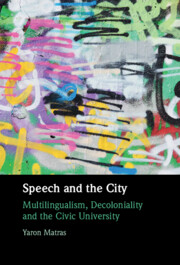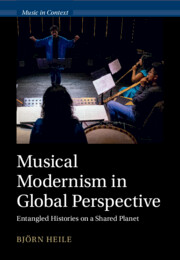Refine search
Actions for selected content:
47 results
Chapter 13 - Promissory Notes and Other Forms of Consent
- from Part I - Storying-to-Learn: How Stories-that-Matter Help Us Appreciate Social Work in Action
-
-
- Book:
- Learning through Social Work Stories-That-Matter
- Published online:
- 28 August 2025
- Print publication:
- 11 September 2025, pp 178-193
-
- Chapter
- Export citation
Mental health care for migrants in the Netherlands: A decolonial perspective
-
- Journal:
- Cambridge Prisms: Global Mental Health / Volume 12 / 2025
- Published online by Cambridge University Press:
- 06 August 2025, e86
-
- Article
-
- You have access
- Open access
- HTML
- Export citation
Decolonizing Decolonization
-
- Journal:
- Comparative Studies in Society and History / Volume 67 / Issue 4 / October 2025
- Published online by Cambridge University Press:
- 02 July 2025, pp. 890-915
-
- Article
-
- You have access
- Open access
- HTML
- Export citation
Chapter 20 - Latinx Realism
- from Part IV - Locations of Realism
-
-
- Book:
- Realism and the Novel
- Published online:
- 05 June 2025
- Print publication:
- 19 June 2025, pp 286-299
-
- Chapter
- Export citation
The modern state, imperial law, and decolonial possibilities: Assessing the effectiveness of law in protecting cultural heritage in Africa during and after colonialism
-
- Journal:
- International Journal of Cultural Property / Volume 31 / Issue 4 / November 2024
- Published online by Cambridge University Press:
- 30 April 2025, pp. 477-495
-
- Article
-
- You have access
- Open access
- HTML
- Export citation
2023 ASR Distinguished Lecture: Decoloniality and Its Fissures. Whose Decolonial Turn?
-
- Journal:
- African Studies Review / Volume 67 / Issue 4 / December 2024
- Published online by Cambridge University Press:
- 19 December 2024, pp. 817-836
-
- Article
- Export citation
4 - Translationality and the Decolonial Gesture in Performance
-
- Book:
- Contemporary Performance Translation
- Published online:
- 19 December 2024
- Print publication:
- 12 December 2024, pp 115-147
-
- Chapter
- Export citation
Overcoming ambiguities in war on terror mechanisms in Africa: Acknowledging Africa is not a country
-
- Journal:
- European Journal of International Security / Volume 10 / Issue 1 / February 2025
- Published online by Cambridge University Press:
- 14 November 2024, pp. 78-96
-
- Article
-
- You have access
- Open access
- HTML
- Export citation
The Decolonial Aesthetics of Failure in Ali Hatami's Haji Washington (1982)
-
- Journal:
- Iranian Studies / Volume 57 / Issue 4 / October 2024
- Published online by Cambridge University Press:
- 07 January 2025, pp. 598-614
- Print publication:
- October 2024
-
- Article
- Export citation
Introduction
-
- Book:
- Musical Modernism in Global Perspective
- Published online:
- 23 May 2024
- Print publication:
- 30 May 2024, pp 1-28
-
- Chapter
- Export citation
3 - (Re)claiming Knowledge
-
- Book:
- Speech and the City
- Published online:
- 23 May 2024
- Print publication:
- 30 May 2024, pp 41-55
-
- Chapter
- Export citation

Speech and the City
- Multilingualism, Decoloniality and the Civic University
-
- Published online:
- 23 May 2024
- Print publication:
- 30 May 2024

Musical Modernism in Global Perspective
- Entangled Histories on a Shared Planet
-
- Published online:
- 23 May 2024
- Print publication:
- 30 May 2024
9 - A Degrowth Perspective on Environmental Violence
- from Part II - Critical Engagement of and with Environmental Violence
-
-
- Book:
- Exploring Environmental Violence
- Published online:
- 06 June 2024
- Print publication:
- 09 May 2024, pp 208-222
-
- Chapter
-
- You have access
- Open access
- HTML
- Export citation
19 - Community Arts, Decoloniality, and Epistemic Justice
- from Part V - Participatory and Community Arts
-
-
- Book:
- The Cambridge Handbook of Community Empowerment
- Published online:
- 18 April 2024
- Print publication:
- 25 April 2024, pp 480-504
-
- Chapter
- Export citation
Epistemic Violence and Colonial Legacies in the Representation of Refugee Women: Contesting Narratives of Vulnerability and Victimhood
-
- Journal:
- International Journal of Law in Context / Volume 20 / Issue 1 / March 2024
- Published online by Cambridge University Press:
- 26 March 2024, pp. 54-73
-
- Article
-
- You have access
- Open access
- HTML
- Export citation
7 - Conclusion
-
- Book:
- The Justice Factory
- Published online:
- 01 December 2023
- Print publication:
- 18 January 2024, pp 277-298
-
- Chapter
- Export citation
Interlude: Colonial Visions
-
- Book:
- Blindness and Spectatorship in Ancient and Modern Theatres
- Published online:
- 30 November 2023
- Print publication:
- 14 December 2023, pp 171-198
-
- Chapter
- Export citation
Transforming African musics at a South African university
-
- Journal:
- British Journal of Music Education / Volume 41 / Issue 2 / July 2024
- Published online by Cambridge University Press:
- 14 December 2023, pp. 168-181
- Print publication:
- July 2024
-
- Article
-
- You have access
- Open access
- HTML
- Export citation
Contested Truths Over COVID-19 in East Africa: Examining Opposition to Public Health Measures in Tanzania and Uganda
- Part of
-
- Journal:
- African Studies Review / Volume 66 / Issue 4 / December 2023
- Published online by Cambridge University Press:
- 22 November 2023, pp. 873-898
-
- Article
-
- You have access
- Open access
- HTML
- Export citation
